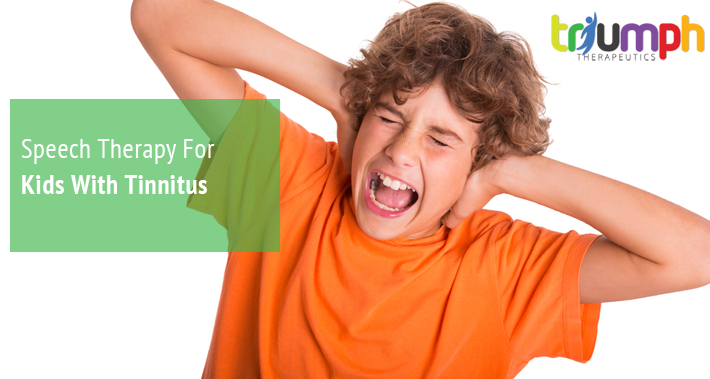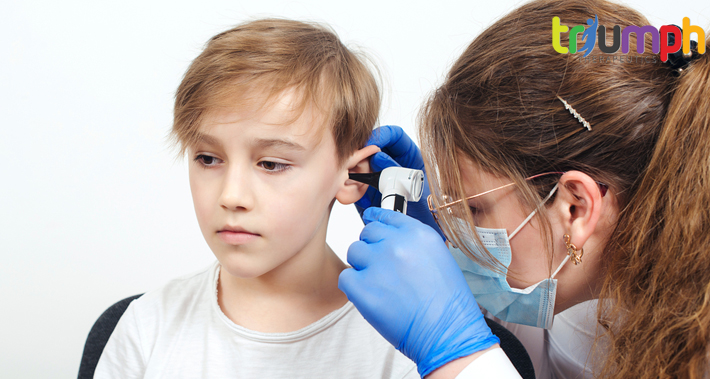Speech Therapy For Kids With Tinnitus
https://www.triumphtherapeutics.com/wp-content/uploads/2022/04/Triumph-Therapeutics-Speech-Therapy-OT-Physcial-Therapist-Washington-DC-Mar01-01-2022.jpg 710 379 Triumph Therapeutics Triumph Therapeutics https://www.triumphtherapeutics.com/wp-content/uploads/2022/04/Triumph-Therapeutics-Speech-Therapy-OT-Physcial-Therapist-Washington-DC-Mar01-01-2022.jpgHas your child been complaining about noises that only they can hear?
Do they seem to have trouble hearing you?
If so, they may have tinnitus.
Most of us have temporarily experienced ringing in our ears at least one or twice.
People with chronic tinnitus; however, experience this ringing, or similar noises, on a persistent or near persistent basis.
If your child is dealing with tinnitus, you may be noticing changes in their hearing and communication skills.
Fortunately, a speech therapist can help get your child back on track.
In this article, we will learn all about tinnitus, its symptoms and causes, and how speech therapy for kids can help.
Let’s take a look.
What Is Tinnitus?
Tinnitus causes you to hear noises, such as ringing or buzzing, despite there being no external source.
Tinnitus may affect one or both ears.
Some people with tinnitus describe it as sounding like it’s coming from inside their head.
Others say it sounds like it’s coming externally.
Tinnitus can be further categorized into objective tinnitus or subjective tinnitus.
In objective tinnitus, the noise is being caused by something within your body, such as a muscle spasm.
In these cases, the noise can be heard by others.
Objective tinnitus is rare.
Subjective tinnitus, which is much more common, produces noises that do not originate from inside
your body and cannot be heard by others.
Additionally, the noises caused by tinnitus can present differently in everyone.
For example, pulsatile tinnitus causes you to hear noises that resemble a heartbeat.
Symptoms of Tinnitus
The symptoms of tinnitus vary widely.
The noises caused by tinnitus may be acute or chronic, bothersome or non bothersome, constant or intermittent, high or low in pitch, and of varying loudness.
Additionally, tinnitus can emerge as a symptom of another disorder or disease, such as autism spectrum disorder, post traumatic stress disorder, or noise induced hearing loss.
Thus, your child’s symptoms may differ than those experienced by other tinnitus sufferers
However, tinnitus often causes certain functional limitations that you can look out for in your child, such as:
- Difficulty concentrating or thinking clearly
- Difficulty following conversations
- Difficulty performing tasks
- Difficulty resting and relaxing
- Difficulty sleeping
- Difficulty with hearing
- Difficulty controlling emotions
- Difficulty communicating
- Social isolation and avoidance
What Causes Tinnitus?
In many cases of tinnitus, the cause remains unknown.
However, there are a few known risk factors.
Hearing loss, no matter the cause, may increase your likelihood of developing tinnitus.
Other known risk factors of tinnitus include:
- Meniere’s disease
- Migraines
- Head injury
- Drugs or medicines that are toxic to hearing
- Anemia
- High blood pressure
- Stress
- Excess earwax
- Certain types of tumors
- Excess caffeine
- Smoking cigarettes
Diagnosing Tinnitus
Tinnitus itself is not a disease, but rather a symptom of another condition.
If you suspect that your child is suffering from tinnitus, your first step should be to take them to a pediatrician to check for some of the known conditions that can cause tinnitus.
Your child’s doctor may refer them to an audiologist for hearing testing since tinnitus can be brought on by hearing loss.
Since tinnitus in and of itself is not a disease, it cannot be measured directly.
Instead, your child’s doctor will ask some questions to determine the severity of the tinnitus.
Some of the questions your child’s doctor may ask include:
- Do you hear the noise in the right ear, left ear, or both?
- Is the noise constant or intermittent?
- Does the noise get worse in the day or night?
- Can you describe the sound?
- Does the sound have a high or low pitch?
- How loud is the sound?
- Does the sound ever get louder, quieter, or change in pitch?
- Does the sound get worse after caffeine, medicine, or hearing loud noises?
- Does the sound make it hard to sleep or concentrate?
Pitch or loudness matching may also be utilized.
Tinnitus pitch matching compares external noises to the noises that your child is hearing in order to determine pitch.
Similarly, tinnitus loudness matching compares external noises to the noises that your child is hearing in order to determine loudness.
How Can Speech Therapy For Kids With Tinnitus Help?
Tinnitus may be affecting your child’s ability to understand and use language.
A speech therapist can help your child overcome these difficulties as well as aid in the continued development of their vocabulary.
If needed, a speech therapist can also help your child learn alternative ways of communicating.
For instance, augmentative and alternative communication includes the use of facial expressions, gestures, and pictures.
A speech therapist will consider your child’s unique needs and limitations to come up with the best therapy plan for you and your child.
Book Your Appointment With Triumph Therapeutics Today
If you are looking for a speech therapist to help your child with tinnitus, consider Triumph Therapeutics.
At Triumph Therapeutics, we strive to provide our clients with the best quality of care.
To learn more about our services and how we can assist you and your child, book an appointment today.


